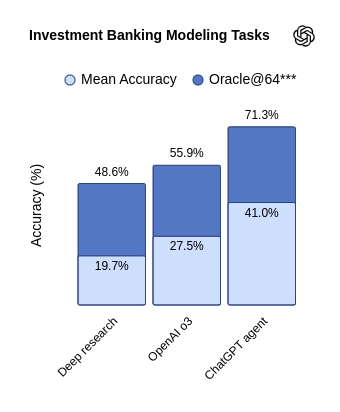
OpenAI's New Agent Feature Triggers Yet Another Silicon Valley Extinction Event
OpenAI's New Agent Feature Triggers Yet Another Silicon Valley Extinction Event
Autonomous AI Assistants Reshape Tech Landscape as Startups Face Existential Crisis
Manus AI, once celebrated as a breakout darling in the autonomous AI space, has gone conspicuously quiet in the wake of OpenAI's latest bombshell. The July 17 launch of ChatGPT Agent—already nicknamed "the Manus killer" by industry insiders—represents a seismic shift that threatens to render dozens of venture-backed startups obsolete overnight. As this technological paradigm shift from conversational AI to autonomous action unfolds, the implications are sending shockwaves through the artificial intelligence ecosystem and raising existential questions for companies caught in its path.
"We're witnessing a mass extinction event in real-time," remarked a prominent Silicon Valley investor who requested anonymity. "OpenAI just turned a $4 billion market segment into a native feature. It's not competition—it's annihilation."
The newly released ChatGPT Agent represents a paradigm shift from conversational AI to autonomous action, merging OpenAI's previous Operator and Deep Research models into what the company describes as a "virtual computer." This unified system can independently navigate websites, execute code, connect to external services, generate documents, and manage complex workflows—all while maintaining human oversight.

"The Manus Killer": How Platform Giants Devour Their Ecosystem
For venture capitalists and founders who bet heavily on AI agents as standalone businesses, OpenAI's announcement represents nothing short of catastrophe. Industry insiders have already nicknamed the release "The Manus Killer," referencing the once-promising startup that raised over $200 million on the premise of building autonomous AI assistants.
"The question every VC partnership is asking today is painfully simple: Why fund startups to build what OpenAI just gave away for free?" said a partner at a top-tier venture firm, speaking on condition of anonymity due to portfolio conflicts.
The challenge for agent-focused startups extends beyond mere feature parity. OpenAI's unified platform offers capabilities many startups cannot match, including state-of-the-art benchmark performance, seamless tool integration, established distribution channels, and enterprise-grade security infrastructure.
"This follows a familiar pattern we've seen with cloud platforms," explained a technology analyst tracking the space. "Remember when AWS started offering services that directly competed with startups built on their infrastructure? We're seeing the same dynamic unfold, only faster and more ruthlessly."
From Excitement to Existential Dread: The Community Reacts
The technical achievements behind ChatGPT Agent have drawn genuine admiration even as they raise alarm bells across the startup ecosystem. Social media platforms erupted with mixed reactions following the release, revealing both excitement about capabilities and concern about implications.
On professional forums, early users describe the system's ability to handle complex, multi-step tasks as "transformative" for knowledge work. "It's like having five people's jobs done by one person with an AI assistant," commented a software developer testing the system for enterprise deployment.
However, concerns about reliability and security dominate discussions among industry professionals. "Do not connect sensitive accounts," warned one highly upvoted Reddit post, highlighting fears about potential data exposure and autonomous systems making consequential decisions without adequate oversight.
YouTube reviewers demonstrated impressive capabilities—from automated research compilation to presentation building—while noting that outputs often require significant human editing. "It's groundbreaking but experimental. Treat it as a public beta for non-critical work," cautioned a popular tech content creator.
The Great Consolidation: Who Survives in the New Landscape?
As the dust settles, a brutal market segmentation is emerging. Industry observers suggest that three categories of AI companies might weather the storm:
- Infrastructure providers with proprietary models or hardware advantages
- Domain-specialized agents with deep vertical integration and proprietary data
- Companies with established user bases and high switching costs
"Everyone else is toast," stated a venture partner bluntly during an emergency portfolio review meeting. "Especially companies building thin wrappers around OpenAI's APIs. That business model died yesterday."
Even established players like Perplexity, Kimi, and DeepSeek are reportedly pivoting away from general-purpose agent positioning, recognizing that commodity tasks at the operating system level will likely be dominated by platform giants.
Beyond the Bloodbath: Navigating the New Reality
For investors, the implications extend beyond immediate portfolio impacts. The power dynamics of the AI industry have shifted dramatically toward consolidation, with OpenAI cementing its position as both infrastructure provider and end-user application.
"We're no longer looking at an open market. This is OpenAI's platform with third-party plugins—much like Apple's App Store or Salesforce's ecosystem," explained a technology investment strategist. "The rules of engagement have fundamentally changed."
Investment Horizon: Where Capital Flows Next
For traders and investors navigating this seismic shift, opportunities may emerge from the chaos. Analysts point to several potential investment themes that could define the post-agent landscape:
Companies developing specialized AI infrastructure may see increased interest, as the race for alternative models intensifies. Firms with established data moats or regulatory advantages in sensitive sectors like healthcare, finance, and government could become acquisition targets for larger platforms seeking domain expertise.
"The value is shifting from general capabilities to specialized knowledge and proprietary data flows," suggested an investment analyst at a major asset management firm. "We're looking at companies that can't be easily replicated by adding features to existing platforms."
Market observers also note that open-source AI initiatives may see renewed momentum as a counterbalance to platform consolidation, potentially creating investment opportunities in companies building commercial applications atop open infrastructure.
Investors should note that these market developments represent unprecedented technological shifts, and past performance patterns may not reliably indicate future outcomes. All investment decisions should be made in consultation with qualified financial advisors familiar with individual risk profiles and objectives.
As Silicon Valley grapples with this latest disruption, one thing becomes clear: the age of standalone AI agents as venture-backed businesses may be ending before it truly began. What emerges next will likely be a more concentrated landscape where the boundaries between platforms and applications continue to blur—reshaping not just technology businesses, but the nature of knowledge work itself.
This article is based on market developments as of July 18, 2025. Investment perspectives represent analysis rather than predictions, and readers are encouraged to consult financial professionals before making investment decisions.